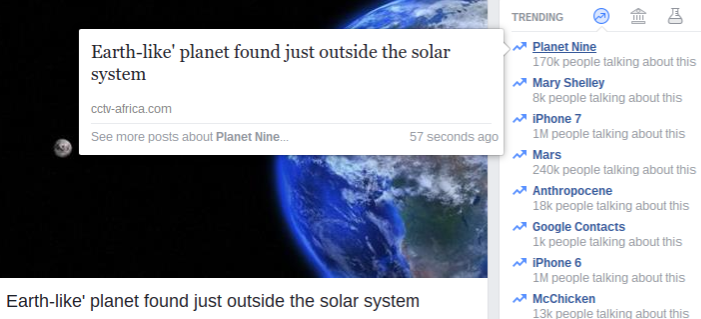Image: Facebook
Two days ago, The Guardian reported that Facebook had “walked” the team of humans that managed their “trending” links, and had handed their jobs over to an algorithm that had apparently been “learning” how to do it. Also reported was the fact that the algorithm is, in their description, a “disaster:”
And given what I saw yesterday, it’s pretty hard not to agree. If the above all constitute “exhibit A,” here’s a follow up:
What’s this? “Planet Nine” is trending? 170,000 people are talking about Planet Nine? Wait — did they find it?
No. No they did not find Planet Nine. Facebook’s “trending” algorithm latched onto a story we covered last week — about Proxima b, the newly-discovered planet orbiting Proxima Centauri — and decided that Proxima b is now the ninth planet in the solar system.
And can I just say that getting your science news from “cctv-africa.com” might not be the best idea either, Facebook? Just because in pretty much nobody’s understanding is 4.25 light years — a distance that would take tens of thousands of years for humans to travel with present technologies — “just outside the solar system.”
Anyway, if you (or Facebook) want to learn about the search for Planet Nine, you can look over at Find Planet Nine, and if you want to know about Proxima b, you can take a look at my post from last week (which has further reading at the bottom).
***
Thanks for reading! Except for the very *very* occasional tip (we take Venmo now!), I only get paid in my own (and your) enthusiasm, so please like This Week In Tomorrow on Facebook, follow me on Twitter @TWITomorrow, and tell your friends about the site!
If you like our posts and want to support our site, please share it with others, on Facebook, Twitter, Reddit — anywhere you think people might want to read what we’ve written. Thanks so much for reading, and have a great week.
***
Richard Ford Burley is a human, writer, and doctoral candidate at Boston College, as well as an editor at Ledger, the first academic journal devoted to Bitcoin and other cryptocurrencies. In his spare time he writes about science, skepticism, feminism, and futurism here at This Week In Tomorrow.


